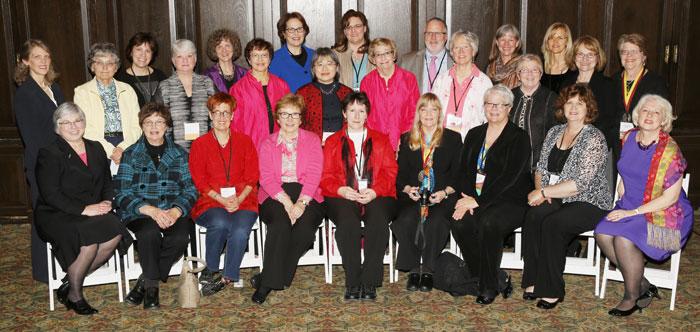30 years of pride and accomplishment
A 2013 survey of the School of Nursing's PhD graduates revealed extraordinary accomplishments. Eighty-eight of the school's 153 PhD grads responded.
- I - International Reach – 13% of alums report international activities as their greatest accomplishment.
“Establishing, developing and starting the MScN degree in Pakistan for the first time”
“Contributing and developing infection control resources in global settings” - M – Mentorship/Teaching – 40%
“Advising graduate students in their graduate research and scholarly projects”
“Mentoring undergraduate and graduate research students
“Becoming a very good teacher” - P – Policy Development/Leadership – 34%
“Developing and implementing the MN Statewide Healthcare
System Preparedness Program”
“Participation in changing rules governing pre-licensure nursing programs for the MN Board of Nursing” - A – Advocacy – 3%
“Advocacy for families in rural areas”
“keeping the most vulnerable at the center of my concern” - C – Care/Collaboration – 19%
Making a difference in the lives of patients by systematically improving care for populations” - T – Theory & Research Development – 42%
“My sustained and innovative program of research”
“Conducting research through continuing collaborations with clinical partners, faculty colleagues and undergraduate students”

More than 30 years of extraordinary reach and achievement
More than 30 years ago the University of Minnesota School of Nursing enrolled the first three students in a new PhD program that has since had broad impact on nursing education and research in Minnesota and around the world.
Prompted by the state’s growing need for nurse scholars and educators, the school secured private and federal planning funds in the late 1970s, and ushered its proposal through a series of required program approval steps at the University and finally with the state’s Higher Education Coordinating Board.
“Interestingly, at the time, the University’s Health Sciences Policy Council had concerns about whether nursing had a significant enough body of knowledge to support and justify a PhD program,” said Mariah Snyder, PhD, RN, professor and director of Graduate Studies at the time.
Once approved, the program became the 23rd nursing PhD in the nation. Building a strong program became a top priority for the School of Nursing, according to Snyder. Graduate assistant positions were funded to attract talented students.
Today the PhD in nursing continues to be the only PhD program in Minnesota. The program’s students and faculty have had a profound impact on nursing research capacity and productivity in Minnesota and worldwide. The School of Nursing’s seven centers of excellence engage PhD students in a range of research and leadership opportunities. Today the school is powered in part by more than $6 million annually in research grant funding from the federal government and other sources (annual, average, direct costs).
Nursing PhD graduates attending the 30-year celebration in 2013

Standing from left: Karen Monsen, Kathleen Niska, Mary Dierich, Diane Treat-Jacobson, Mary Benbenek, Marilyn Loen, Mary Chesney, Miaofen Yen, Kris Talley, Rhoda Hooper, Mark Kirschbaum, Martha Turner, Denise Remus, Mary Tanner, Laura Kirk, Susan Moch, Melissa Avery.
Seated from left: Mary Rowan, Margot Nelson, Cheryl Robertson, Mary "Casey" Hooke, Ann Marie Dose, Miriam Cameron, Diane Holland, Pamela Nelson, Sonja Meiers